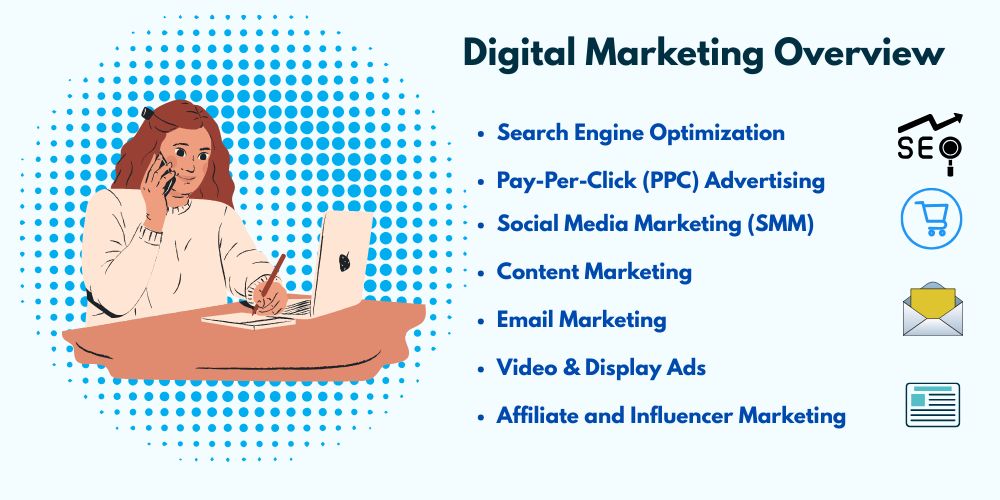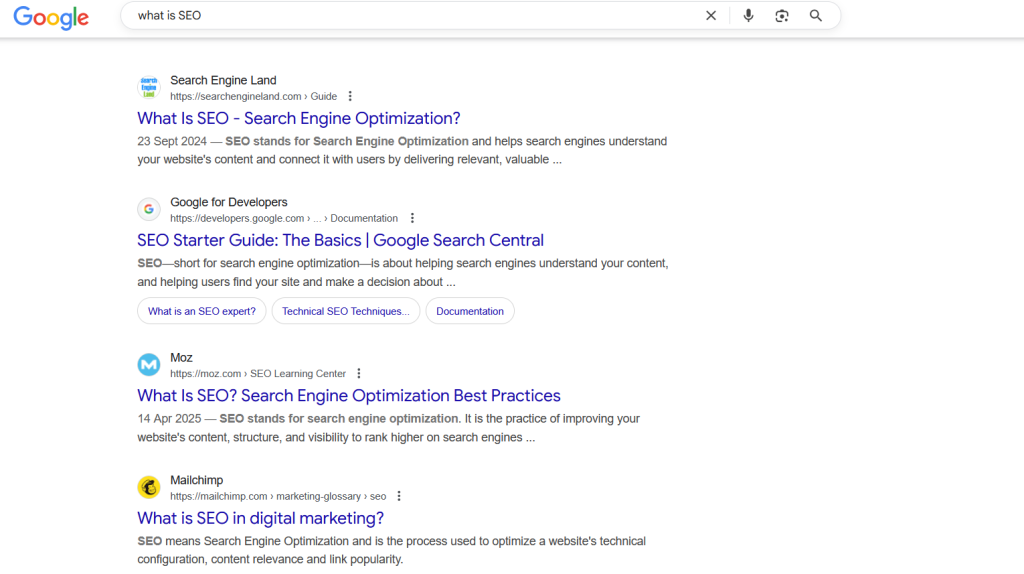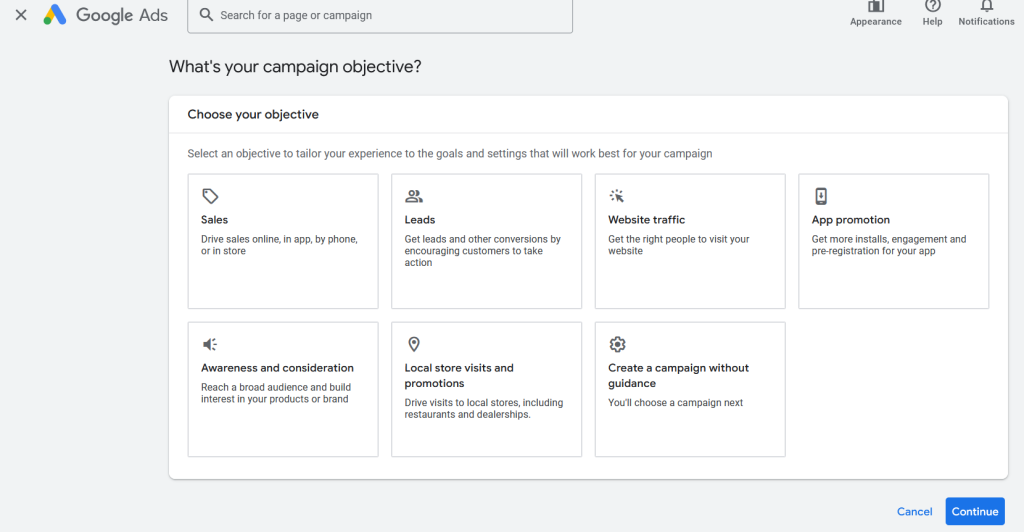
Digital Marketing needs no introduction, but it’s important to understand it thoroughly to make the most of it. Whether you are a student or a business, it can offer you countless opportunities to grow, engage, and earn in the digital world. If you are new to digital marketing or want to get to its core, this guide will help.
What is Digital Marketing?
In simple terms, it is promoting products and services on the internet. It is a type of marketing that uses different techniques and channels that help with brand promotion, acquire customers, and make money. Unlike traditional marketing that relies on TV, print media, or radio, digital marketing uses online channels like websites, social media platforms, email, mobile apps, etc, to achieve its marketing goals.
Digital Marketing vs Traditional Marketing
| Aspect | Digital Marketing | Traditional Marketing |
| Reach | Global, Instant | Local or regional |
| Cost | Generally more cost-effective | Often expensive (TV, print, radio) |
| Targeting | Highly specific (age, location, interest) | Broad and generalised |
| Measurability | Real-time analytics | Difficult to measure impact |
| Engagement | Interactive (likes, comments, and shares) | One-way communication |
| Flexibility | Easy to update or change | Fixed once published or aired |
| Speed | Fast setup and immediate results | Slower to launch and get feedback |
At its core, digital or online marketing is all about connecting brands with their target audience through the right channels.
Examples:
- Google search for “black Nike Shoes.”
- Instagram/Facebook ad on “Myntra Monsoon Sale”
- YouTube Video on “How Canva Helps You Make Money”?
Digital marketing ensures that brands show up where their audience/customers spend most of their time, i.e, online!
Key Channels in Digital Marketing
Channels in digital marketing refer to the different techniques and online platforms used to communicate with and reach a target audience.
-
Search Engine Optimization (SEO)

It is the practice of getting a website rank higher in Google Search Results (SERPs). It involves different strategies like keyword research, user experience, technical SEO, on-page, off-page, etc,.
The webpages that appear in your search results (organic search results) when you something on Google are because of SEO efforts.
-
Pay-Per-Click (PPC) Advertising
It is the practice of running ads on platforms like Google or Bing to drive traffic instantly to a website. It uses different techniques, such as audience targeting, budget management, ad copywriting, etc., to ensure the ad appears at the top of search results or in users’ feeds.

The sponsor links that you see above the organic search results when you search for something on Google are because of PPC.
-
Social Media Marketing (SMM)
It involves promoting brands and their offerings on different social media platforms via images, short videos, or text. There are many social media platforms widely used for online promotions, including Facebook, Instagram, Pinterest, Snapchat, Twitter, TikTok, YouTube, and more.
-
Content Marketing
It is all about creating blog posts, videos, website content, and infographics to engage, inform, entertain, and sometimes convert the target audience.
-
Email Marketing
This is a practice brands use to send targeted emails to nurture leads, build loyalty, or make sales. An example of this is a promotional email from Myntra about their weekend sale.
-
Video & Display Ads
Creating engaging visual (imagery and videos) content to capture user attention across the web. The ‘Astrotalk” ad that you often interrupt your favourite show on YouTube is an example of video ads.
-
Affiliate and Influencer Marketing
This technique involves collaborating with content creators or partners to expand their reach and intensify sales.
Why is Digital Marketing Important?
One reason that makes digital marketing powerful is that it allows brands to meet their target audience where they are, i.e., on the internet. Before digital marketing, businesses entirely relied on TV, radio, and print media for marketing. But traditional marketing had its limitations – limited reach (local or regional), little control over who saw the message, and no way to know the effectiveness.
Moreover, even the customers were not able to “search” for the products or services they needed. Instead, they had to rely on word-of-mouth or physical directories.
At the time, the internet did exist. But the content was mostly static (websites were designed like online brochures), and users consumed information without interaction or personalisation.
However, with the internet reaching almost every human, the marketing game drastically changed. Today, there are over 5.64 billion internet users globally (as of April 2025), and countless interactive online platforms. It’s because of digital marketing that brands can cater to a global audience and customers can “search” their required products or services from across the globe.
So, here’s why digital marketing matters:
- Brands can target global audiences and hyper-local markets.
- Compared to TV or print ads, brands can launch ad campaigns on low budgets and still achieve great results.
- Using different digital marketing tools, it is easier to get real-time data on user behaviour and campaign performance.
- Interactive features, like polls, stories, or chats, allow businesses to build deeper relationships with their audience.
For example, email marketing delivers an average ROI of $36-$40 per dollar spent. This is far higher than most traditional marketing methods. Similarly, PPC ads on Google can generate double the return on ad spend when targeted rightly.
How To Get Started With Digital Marketing?
Getting started with digital marketing, as a student or a professional, requires no degree or prior experience. If you are curious and consistent, a little guidance can make you a PRO in the field.
Here’s a step-by-step path you can follow:
-
Learn the Basics
Start by understanding what digital marketing is and how it works, which supposedly you’re already doing! Learn how websites appear on Google, how social media algorithms work, and what makes people click on certain ads and skip others.
Learning the basics of digital marketing doesn’t require spending money. Many free, easy-to-follow courses on platforms like Google’s Digital Garage, HubSpot Academy, and Coursera explain everything in a beginner-friendly manner and can help you build a strong foundation.
-
Choose a Focus Area
You don’t need to master everything at once. Choose one or two areas based on your interests:
- Good with visuals? Explore social media or design.
- Love writing? Try content marketing.
- Good with numbers? Go into SEO, analytics, or PPC.
- Great at creative ideas? Opt for video or influencer marketing.
-
Practice with Mock or Real Projects
You can start a simple blog, run a mock Instagram campaign, or build a sample Google Ads campaign. Write blogs on topics you enjoy, use hashtags, and post designs on Instagram to test engagement, or create a simple ad to learn how targeting and budgeting work.
Once you’ve grasped the understanding of how digital marketing basics work, you can even help a local business improve their online presence. This will give you real-world experience that employers truly value.
-
Use Tools Early On
Learning digital marketing means getting comfortable with the tools professionals use every day. These tools help you research, create, track, and improve your campaigns. Some of the top tools you must learn using are:
- Keyword Planner, SEMRush, or Ahrefs for keyword research
- Canva for content design
- Google Analytics for performance tracking
- MailChimp for email campaigns
- Yoast for SEO content optimization
Using these tools early on gives you practical skills and confidence, making your work and resume more effective.
-
Build a Portfolio
Documenting your work – both personal or practice projects – shows that you’ve real skills, not just knowledge. Creating a simple website or updating your LinkedIn with your campaigns, designs, or results helps you stand out to employers and clients by giving them proof of what you can do.
Is Digital Marketing Legit?
Absolutely. Digital marketing is today one of the fastest-growing and most in-demand fields. Some people wrongly assume it’s a scam because of spammy tactics they see online – like fake influencers or clickbait ads.
However, legitimate digital marketers follow ethical guidelines, use data rightly to make decisions, and work in every type of company, from startups to global competitors. In fact, almost every modern business hires digital marketers to manage their brand and online growth.
So, if you stay ethical, skill-focused, and results-driven, there’s a massive potential for a successful, long-term career.
How Much Do Digital Marketers Make?
Salaries in digital marketing vary by role, experience, and location. But one thing is sure – the industry offers strong earning potential. As businesses shift more of their budget online, skilled digital marketers are in high demand. Also, those with expertise in areas like SEO, paid ads, analytics, or AI tools often experience faster promotions and salary raises, and leadership roles over time.
Average Digital Marketing Salaries (in US and India) in 2025
| Roles | United States (USD/year) | India (INR/year) |
| Digital Marketing Specialist | $55,000-$70,000 | ₹4-₹7 lakhs |
| SEO Manager | ~ $77,000 | ₹6-₹10 lakhs |
| Social Media Manager | $55,000-$80.000 | ₹4.5 – ₹8.5 lakhs |
| Content Marketers/Copywriter | $70,000 – $104,000 | $5-$9 lakhs |
| Digital Marketing Manager | ~89,500 avg(100k+ at big firms) | ₹10-₹18 lakhs |
| CMO (Chief Marketing Officer) | $180,000-$250,000+ | ₹35 lakhs-₹1 crore+ |
Notes:
- In India, salaries vary widely by city, company size, and experience. Metro cities like Bangalore, Mumbai, and Delhi NCR offer the highest packages.
- In both regions, freelancers and consultants may earn more depending on specialisation and client base.
- With AI and automation skills, digital marketers often make 10%-30% higher pay in both countries.
What’s New in Digital Marketing After AI?
The rise of artificial intelligence (AI) is reshaping digital marketing faster than ever before. AI-powered tools are now creating ads, writing emails, designing visuals, and even optimising ad spend.
Key Trends After AI’s Entry
- AI-Generated Content
Marketers now use AI tools like ChatGPT, Jasper, and Copy.ai to create blog posts, emails, product descriptions, and more. This has cut content creation time in half.
- Smarter Advertising
Platforms like Google and Meta now use AI to auto-generate and optimise ads based on user behaviour. This means better performance with less manual setup.
- Emerging Roles
AI in digital marketing has generated several new roles, such as:
- AI Marketing Strategist
- Prompt Engineer
- Automation Architect
- Performance Marketing Analyst (AI-focused)
- AI-CRM Specialist
These roles focus on how to use AI tools ethically, creatively, and efficiently in digital marketing.
- Personalisation at Scale
AI tools analyse customer data in no time to send tailored messages — like showing one product to a teenager and another to a working professional visiting the same website. This increased personalisation helps businesses acquire more customers and retain them.
- Job Security and Human Creativity
While AI can handle repetitive tasks, marketers still lead on strategy, storytelling, and emotional engagement. Agencies now look for hybrid professionals who can combine human creativity with AI efficiency.
This means that in 2025 and times ahead, knowing how to work with AI and not against it is a powerful skill for digital marketers.
A Quick Checklist For Digital Marketing Strategy
Marketers need a roadmap to achieve their marketing goals, and a digital marketing strategy does the same thing. It is a detailed plan that outlines how a business will utilize digital channels to achieve its marketing goals.
A strong digital marketing strategy helps marketers stay focused on clear goals – their efforts become more organised, results-driven, and easier to measure over time.
Here’s a quick checklist to create a digital marketing strategy:
- Set Clear Goals
Start by deciding what you want to achieve with your digital marketing effort. It can be anything, like more website visits (traffic), leads, or sales. When you have specific goals, you stay focused and measure your progress to achieving them.
- Know Your Audience
Understanding who your ideal customers are helps you create better messages and choose the right platforms to channel them. Create a basic profile (age, interests, location, problems they face) so your messages speak directly to them.
- Choose the Right Channels
Trying to be everywhere at once can make your effort go in vain. It’s always best to pick 2-3 platforms where your audience spends the most time to get better results without burning out.
- Create Quality Content
Plan and produce engaging or useful content such as blog posts, videos, or social media updates. Good content builds trust and keeps people interested.
- Launch Campaigns
Once you have created content and ads, launch your campaigns. Whether you are posting on social media or running ads, execution is key.
- Analyse & Improve
Only by tracking the results can you know if you’re headed in the right direction. Use tools like Google Analytics to track your results. See what works, what doesn’t, and make changes to improve performance over time.
Frequently Asked Questions
- How do I start a career in digital marketing with no experience?
To build a career as a digital marketer:
- Start by enrolling in a free couse to learn the basics.
- Build a portfolio with internships, mock projects, or freelance work to gain hands-on experience.
- Apply in various companies as a fresher.
- What are the best skills to learn in digital marketing?
Some highly demanded skills include SEO, PPC (Google Ads), social media management, email marketing, content writing, and analytics. These days, AI tools and prompt engineering are also highly valuable.
- Is digital marketing a stable and high-paying career?
Yes, digital marketing is a fast-growing and highly demanded career option globally. While the salaries vary by role and experience, skilled professionals in areas like SEO, performance marketing, or AI-driven strategy are often paid well.
- Can I switch to digital marketing from a non-marketing background?
Yes, many professionals switch to digital marketing from fields like sales, engineering, design, or writing. With the right training, certifications, and practical projects, you can build a strong profile regardless of your background.
- How long does it take to become good at digital marketing?
While you can learn the basics in 2-3 months, mastering digital marketing takes time and practice. With consistent effort, many people become job-ready in 6-12 months.
- Can I do digital marketing from home or as a freelancer?
Absolutely. Many digital marketers work remotely or freelance, offering services like SEO, content writing, social media, or ad management to clients worldwide.
- Do I need to know coding for digital marketing?
No, most digital marketing roles don’t require coding. However, basic knowledge of HTML, CSS, or how websites work can be helpful, especially for SEO, email marketing, and analytics.
- Is digital marketing still relevant after AI?
Actually, it’s more relevant than ever. AI is transforming how campaigns are created and optimised, but strategic thinking, creativity, and ethical decision-making still require human marketers.
- The Role of Personality Development in MBA Career Success - October 5, 2025
- Best Online MBA Programs in USA - September 27, 2025
- How Important is AI for MBA Students? - September 18, 2025
